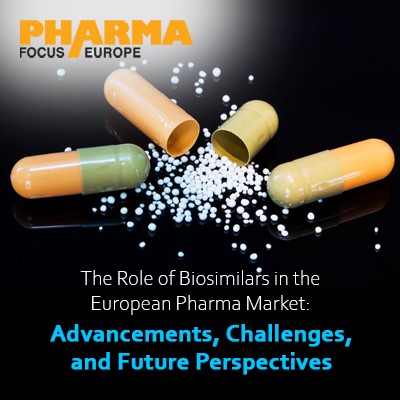
This article explores the evolving role of biosimilars in the European pharmaceutical market, focusing on advancements, challenges, and future perspectives. Biosimilars, mimicking existing biologics, offer cost-effective alternatives. Recent progress in analytical techniques, manufacturing, and regulatory support fosters increased acceptance, addressing economic concerns and expanding the biosimilar pipeline for improved patient outcomes in complex therapeutic areas.

Introduction:
The European pharmaceutical landscape has undergone remarkable transformations in recent years, with the emergence of biosimilars playing a pivotal role in reshaping the industry. Before delving into the intricacies of biosimilars and their evolving role, it's crucial to establish a foundation by understanding the term "biologics." Biologics refers to a class of medicinal products derived from living organisms, utilizing advanced biotechnological processes to create complex molecules, often including proteins, antibodies, or nucleic acids.
This article aims to comprehensively explore the evolving role of biosimilars in the European pharmaceutical market. We will provide insights into advancements, challenges, and future perspectives that shape the landscape of pharmaceutical research and development. Join us as we navigate through the complexities of this dynamic field, seeking to offer readers a nuanced understanding of the present and a glimpse into the promising future where innovation and accessibility converge in the realm of biologic therapies.
Understanding Biosimilars:
Biologics represent a class of medicinal products derived from living organisms, including proteins, antibodies, or nucleic acids. Biosimilars, often referred to as "generic biologics," closely mimic existing biologic drugs. These offer a more cost-effective alternative without compromising effectiveness or safety, similar to generic versions of conventional medications. Regulatory agencies, such as the European Medicines Agency (EMA), play a crucial role in scrutinizing biosimilars to ensure they meet stringent guidelines for approval.
Advancements in Biosimilar Development:
a. Analytical Techniques:
Recent advances in analytical tools, such as mass spectrometry and nuclear magnetic resonance, provide unprecedented accuracy in scrutinizing the molecular structure of biosimilars. This ensures biosimilars mirror their reference biologics not just functionally but at the molecular level, instilling confidence in their equivalence.
b. Manufacturing Processes:
The refinement of manufacturing processes, notably through continuous bioprocessing, streamlines production, reduces costs and enhances biosimilar consistency. This not only expedites development but contributes to the overall accessibility of these vital therapies.
c. Case Studies:
Case studies exemplify advancements. For instance, in developing a biosimilar for a widely-used monoclonal antibody in oncology, innovative cell line development techniques, and improved purification methods resulted in a biosimilar nearly indistinguishable from the reference product.
In summary, the progress in biosimilar development is tangible, measured in the precision of analytical tools, manufacturing efficiency, and the successful replication of complex biologics.
Regulatory Landscape and Market Dynamics:
The regulatory landscape governing biosimilars in Europe is well-established, ensuring a robust framework for approval and market entry. Recent adjustments include intensified post-marketing surveillance by the EMA, emphasizing the importance of real-world evidence to continuously refine regulatory standards.
Market dynamics indicate increased biosimilar acceptance across therapeutic areas. This shift, bolstered by regulatory support and pharmaceutical initiatives, fosters competition, driving down biologic therapy costs.
By incorporating these developments, a nuanced understanding of biosimilars' regulatory and market dynamics in the current European pharmaceutical landscape emerges.
Challenges in Biosimilar Adoption:
Recognizing challenges in biosimilar adoption, proactive measures address skepticism among healthcare professionals and patients. Robust educational initiatives target physicians, bridging knowledge gaps about bio similarity principles, real-world evidence, and seamless biologic-to-biosimilar transitions. Patient-centric campaigns foster awareness, emphasizing biosimilar safety, efficacy, and cost-effectiveness. Efforts to harmonize healthcare policies across European countries aim to promote consistent biosimilar therapy integration.
These initiatives demonstrate that addressing skepticism involves tangible, strategic efforts to educate healthcare professionals and patients, fostering a supportive biosimilar adoption environment in European healthcare practices.
The Economic Impact of Biosimilars:
Delving into the economic landscape, biosimilars' impact is substantial and quantifiable. On an individual level, biosimilar affordability for patients is evident. Consider a patient traditionally relying on a reference biologic for a chronic condition. Biosimilar availability maintains therapeutic efficacy while substantially lowering patient out-of-pocket expenses. Systemically, as biosimilar adoption increases, healthcare systems allocate resources more strategically, amplifying overall efficiency and sustainability across Europe.
Future Perspectives and Emerging Trends:
Looking ahead, continuous biotechnological advancements and ongoing research and development efforts promise an expanding biosimilar pipeline across therapeutic categories. Increased collaboration among pharmaceutical companies, regulatory bodies, and healthcare professionals addresses challenges, promoting wider biosimilar acceptance.
Biosimilars are anticipated to play a crucial role in addressing unmet medical needs, particularly in complex biologics used in oncology, immunology, and neurology. This holds the potential to revolutionize treatment approaches and improve patient outcomes.
In the dynamic pharmaceutical landscape, biosimilars are poised to play a more pivotal role in the future of healthcare in Europe. Ongoing advancements and a deepening understanding of biosimilar development complexities promise a landscape where these biological replicas become synonymous with innovation, accessibility, and sustainability.
Conclusion:
In conclusion, biosimilars represent more than replicas of existing biologics; they symbolize a paradigm shift in healthcare. The journey from understanding biosimilars to their widespread acceptance is a testament to the resilience and adaptability of the European pharmaceutical landscape. The story of biosimilars unfolds as a narrative of progress, collaboration, and a commitment to shaping a healthcare future where innovation is accessible to all. The evolution of biosimilars in Europe continues to be written, promising a future where biologic therapies are not just treatments but cornerstones of a healthier tomorrow.